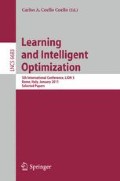Abstract
The main drawback of most metaheuristics is the absence of effective stopping criteria. Most implementations stop after performing a given maximum number of iterations or a given maximum number of consecutive iterations without improvement in the best known solution value, or after the stabilization of the set of elite solutions found along the search. We propose probabilistic stopping rules for randomized metaheuristics such as GRASP and VNS. We first show experimentally that the solution values obtained by GRASP fit a Normal distribution. Next, we use this approximation to obtain an online estimation of the number of solutions that might be at least as good as the best known at the time of the current iteration. This estimation is used to implement effective stopping rules based on the trade off between solution quality and the time needed to find a solution that might improve the best found to date. This strategy is illustrated and validated by a computational study reporting results obtained with some GRASP heuristics.
Access this chapter
Tax calculation will be finalised at checkout
Purchases are for personal use only
Preview
Unable to display preview. Download preview PDF.
References
Bartkutė, V., Felinskas, G., Sakalauskas, L.: Optimality testing in stochastic and heuristic algorithms. Technical report, Vilnius Gediminas Technical University, pp. 4–10 (2006)
Bartkutė, V., Sakalauskas, L.: Statistical inferences for termination of markov type random search algorithms. Journal of Optimization Theory and Applications 141, 475–493 (2009)
Boender, C.G.E., Rinnooy Kan, A.H.G.: Bayesian stopping rules for multistart global optimization methods. Mathematical Programming 37, 59–80 (1987)
Dahl, G., Johannessen, B.: The 2-path network problem. Networks 43, 190–199 (2004)
Dorea, C.: Stopping rules for a random optimization method. SIAM Journal on Control and Optimization 28, 841–850 (1990)
Duin, C., Voss, S.: The Pilot method: A strategy for heuristic repetition with application to the Steiner problem in graphs. Networks 34, 181–191 (1999)
Evans, M., Hastings, N., Peacock, B.: Statistical Distributions, 3rd edn. Wiley, New York (2000)
Feo, T.A., Resende, M.G.C.: Greedy randomized adaptive search procedures. Journal of Global Optimization 6, 109–133 (1995)
Festa, P., Resende, M.G.C.: GRASP: An annotated bibliography. In: Ribeiro, C.C., Hansen, P. (eds.) Essays and Surveys in Metaheuristics, pp. 325–367. Kluwer Academic Publishers, Dordrecht (2002)
Festa, P., Resende, M.G.C.: An annotated bibliography of GRASP, Part I: Algorithms. International Transactions in Operational Research 16, 1–24 (2009)
Festa, P., Resende, M.G.C.: An annotated bibliography of GRASP, Part II: Applications. International Transactions in Operational Research 16, 131–172 (2009)
Hart, W.E.: Sequential stopping rules for random optimization methods with applications to multistart local search. SIAM Journal on Optimization 9, 270–290 (1998)
Jain, R.: The Art of Computer Systems Performance Analysis: Techniques for Experimental Design, Measurement, Simulation, and Modeling. Wiley, New York (1991)
Kariv, O., Hakimi, L.: An algorithmic approach to nework location problems, Part II: The p-medians. SIAM Journal of Applied Mathematics 37, 539–560 (1979)
Orsenigo, C., Vercellis, C.: Bayesian stopping rules for greedy randomized procedures. Journal of Global Optimization 36, 365–377 (2006)
Rardin, R.L., Uzsoy, R.: Experimental evaluation of heuristic optimization algorithms: A tutorial. Journal of Heuristics 7, 261–304 (2001)
Rao, M.R.: Cluster analysis and mathematical programming. Journal of the American Statistical Association 66, 622–626 (1971)
Resende, M.G.C., Ribeiro, C.C.: GRASP. In: Burke, E.K., Kendall, G. (eds.) Search Methodologies, 2nd edn. Springer, Heidelberg (to appear)
Resende, M.G.C., Ribeiro, C.C.: A GRASP with path-relinking for private virtual circuit routing. Networks 41, 104–114 (2003)
Resende, M.G.C., Ribeiro, C.C.: GRASP with path-relinking: Recent advances and applications. In: Ibaraki, T., Nonobe, K., Yagiura, M. (eds.) Metaheuristics: Progress as Real Problem Solvers, pp. 29–63. Springer, Heidelberg (2005)
Resende, M.G.C., Ribeiro, C.C.: Greedy randomized adaptive search procedures: Advances, hybridizations, and applications. In: Gendreau, M., Potvin, J.-Y. (eds.) Handbook of Metaheuristics, 2nd edn., pp. 283–319. Springer, Heidelberg (2010)
Resende, M.G.C., Werneck, R.F.: A hybrid heuristc for the p-median problem. Journal of Heuristics 10, 59–88 (2004)
Ribeiro, C.C., Rosseti, I.: A parallel GRASP heuristic for the 2-path network design problem. In: Monien, B., Feldmann, R.L. (eds.) Euro-Par 2002. LNCS, vol. 2400, pp. 922–926. Springer, Heidelberg (2002)
Ribeiro, C.C., Rosseti, I.: Efficient parallel cooperative implementations of GRASP heuristics. Parallel Computing 33, 21–35 (2007)
Serifoglu, F.S., Ulusoy, G.: Multiprocessor task scheduling in multistage hybrid flow-shops: A genetic algorithm approach. Journal of the Operational Research Society 55, 504–512 (2004)
Tansel, B.C., Francis, R.L., Lowe, T.J.: Location on networks: A survey. Management Science 29, 482–511 (1983)
Vinod, H.D.: Integer programming and the theory of groups. Journal of the American Statistical Association 64, 506–519 (1969)
Voss, S., Fink, A., Duin, C.: Looking ahead with the Pilot method. Annals of Operations Research 136, 285–302 (2005)
Author information
Authors and Affiliations
Editor information
Editors and Affiliations
Rights and permissions
Copyright information
© 2011 Springer-Verlag Berlin Heidelberg
About this paper
Cite this paper
Ribeiro, C.C., Rosseti, I., Souza, R.C. (2011). Effective Probabilistic Stopping Rules for Randomized Metaheuristics: GRASP Implementations. In: Coello, C.A.C. (eds) Learning and Intelligent Optimization. LION 2011. Lecture Notes in Computer Science, vol 6683. Springer, Berlin, Heidelberg. https://doi.org/10.1007/978-3-642-25566-3_11
Download citation
DOI: https://doi.org/10.1007/978-3-642-25566-3_11
Publisher Name: Springer, Berlin, Heidelberg
Print ISBN: 978-3-642-25565-6
Online ISBN: 978-3-642-25566-3
eBook Packages: Computer ScienceComputer Science (R0)

